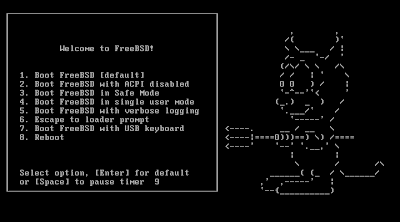Procedure on how to solve FreeBSD boot up problem with the error message:
Loading configuration files.
/etc/rc.conf:51 Syntax error: Unterminated quoted string
Enter full pathname of Shell or RETURN for /bin/sh:
This error is normally encountered if there is a misplaced or missing double quote in the configuration file of the FreeBSD installation.
Sample invalid rc.conf file:
usbd_enable="YES
dbus_enable="YES"
compat5x_enable="YES"
Note that there is a missing double quote in the example above. This error may also be triggered by a misplaced or unnecessary double quote in the configuration file.
To fix this problem:
1. (Optional) Reboot your FreeBSD and select the login option:
4. Boot FreeBSD in single user mode
This can by done by pressing the number 4 upon boot up.

2. Press ENTER after the error message:
Loading configuration files.
/etc/rc.conf:51 Syntax error: Unterminated quoted string Enter full pathname of Shell or RETURN for /bin/sh:
3. Type mount -a -t ufs then press enter.
The argument following the -t is used to indicate the file system type. The type ufs is the default. The -t option can be used to indicate that the actions should only be taken on file systems of the specified type.
- or -Loading configuration files.
/etc/rc.conf:51 Syntax error: Unterminated quoted string
Enter full pathname of Shell or RETURN for /bin/sh:
This error is normally encountered if there is a misplaced or missing double quote in the configuration file of the FreeBSD installation.
Sample invalid rc.conf file:
usbd_enable="YES
dbus_enable="YES"
compat5x_enable="YES"
Note that there is a missing double quote in the example above. This error may also be triggered by a misplaced or unnecessary double quote in the configuration file.
To fix this problem:
1. (Optional) Reboot your FreeBSD and select the login option:
4. Boot FreeBSD in single user mode
This can by done by pressing the number 4 upon boot up.

2. Press ENTER after the error message:
Loading configuration files.
/etc/rc.conf:51 Syntax error: Unterminated quoted string Enter full pathname of Shell or RETURN for /bin/sh:
3. Type mount -a -t ufs then press enter.
The argument following the -t is used to indicate the file system type. The type ufs is the default. The -t option can be used to indicate that the actions should only be taken on file systems of the specified type.
Type mount -a then press enter.
This will mount all the file systems described in fstab.
3. Open the configuration file by typing:
/usr/bin/ee /etc/rc.conf
You may also use your preferred editor like vi, pico, etc. by replacing ee. (/usr/bin/vi /etc/rc.conf, /usr/bin/pico /etc/rc.conf)
4. Modify rc.conf and ensure that there is no missing or misplaced characters.
5. Press ESC to exit editor.
6. Save changes.
7. Reboot by using the command:
shutdown -r now
Good Luck!